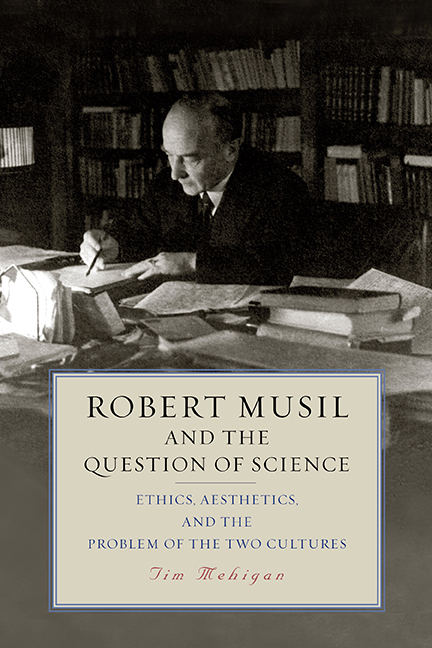Book contents
- Frontmatter
- Contents
- Preface
- Introduction: Musil’s Intellectual Position
- Part I Musil and the Two Cultures
- Part II Aesthetics and Ethics in the Context of the Two Cultures
- Conclusion: “A General Secretariat of Precision and Soul”: Ethics, Knowledge, and Literature after the Fourth Revolution 149
- References
- Index
9 - Musil’s Correspondence Project: The Man Without Qualities and The Blackbird
Published online by Cambridge University Press: 26 April 2020
- Frontmatter
- Contents
- Preface
- Introduction: Musil’s Intellectual Position
- Part I Musil and the Two Cultures
- Part II Aesthetics and Ethics in the Context of the Two Cultures
- Conclusion: “A General Secretariat of Precision and Soul”: Ethics, Knowledge, and Literature after the Fourth Revolution 149
- References
- Index
Summary
IN HIS FICTION, his short prose works, and the major novel, The Man Without Qualities, Robert Musil experiments with “multivariate” correspondences. As I endeavor to make evident in this chapter, these experiments may be understood as apparently random occurrences in the narrative material that build up to a different level of coherence when the factor of similarity or correspondence is applied. The significance of such similarity is only evident when it is appreciated how sharply the notion of multivariate correspondence, as Musil deploys it, breaks with the conventions and habits of traditional narration. This break principally serves the goal of enabling new modes of understanding and response to come into view that are commensurate with the increasing complexity of the world. Early versions of this correspondence project can be identified in writings such as the short story “The Flypaper” (1913) and the two novellas of Unions (1911), though these works will not be discussed here (the reader is instead referred to my discussions of these two works in chapters 6 and 7 respectively). In what follows, l will focus attention on two aspects of what I consider to be Musil's correspondence project: first, on passages from the major novel in which the essential form of this project is outlined; and, secondly, in the context of the later story The Blackbird, on a utopia of inductive experience developed from the idea of correspondence that is expressed in that work in a particularly striking way.
The Man Without Qualities
Musil's approach to narrative presupposes the primacy of form and function. 2 In this approach, a substantive element does not become visible, as it were, “inside out” from the viewpoint of a pre-stabilized subjectivity, as might be considered the norm in conventional narrative, where actors, at least notionally, are instances of, or become the conduit for, sovereign narrative experience. Rather, attention is directed away from these putatively sovereign actors or “protagonists” as the gaze of the narrative begins to settle on external events and the contextual features with which these actors contingently align. This approach to structuring the narrative is already discernible in the first sentences of The Man Without Qualities. Musil does not speak in these first sentences uncomplicatedly, as would be typical of a conventional novel, of “a beautiful August day.” Instead, his narrator refers to “a barometric low that migrated eastward toward a high positioned over Russia.”
- Type
- Chapter
- Information
- Robert Musil and the Question of ScienceEthics, Aesthetics, and the Problem of the Two Cultures, pp. 135 - 148Publisher: Boydell & BrewerPrint publication year: 2020



